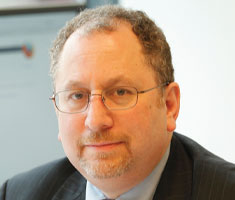LONGTIME SUPPORTER MARTY FRIEDMAN MAKES ESTATE-PLAN GIFT TO HELP FUND AJWS’S FUTURE

Marty Friedman
Marty Friedman began supporting American Jewish World Service shortly after the organization was founded in the mid-1980s. In 1989, when he moved to Chicago, he said, “I've been giving you money for a few years. Is there anything else I can be doing?”
AJWS put Marty in touch with other young supporters in his area, and they formed a local affiliate group. “We did tabling at Jewish cultural festivals,” he says. “And we arranged to have the head of AJWS come and speak at the Northwestern Hillel. It was low-key, grassroots outreach.” After moving to New York in 1992, Marty joined the board of trustees where he served for 30 years—including a term as board chair from June 2002 to May 2006.
To ensure that his support continues beyond his lifetime, Marty has arranged a legacy gift to AJWS in his estate plan. “There’s a way to extend what you want to bring to the world beyond you,” he says. “When I look at the marginal impact I can have, AJWS seems like the right scale. My support can be really helpful and meaningful.”
One of the things Marty says he has come to appreciate through his affiliation with AJWS is that social change is both broad and societal. “For every person we help in a country where they wouldn’t otherwise be helped, it's life changing,” he says. “The people who run the organizations AJWS supports are incredibly smart, incredibly thoughtful and obviously incredibly hard-working. We are here to help them in whatever ways they feel they need assistance, but we're not here to tell them what to do. They are much more capable of solving their own problems than we could ever be.”
Marty says he is always inspired when he meets a project partner from the developing world. “The grassroots funding that we are committed to has demonstrated a lot of success,” he says. “For most of us, the figure of success in life is just being lucky. I wish more people appreciated that. When you see and meet people with different paths, it gives you an appreciation for your own. I feel it gives me a sense of responsibility rather than a sense of entitlement.”
He continues, “From the beginning, the Jewish-based, social justice, grant-making organization resonated with me. In an ideal world, who are the Jewish people? They're the people who remember that we were strangers in Egypt, and now we've got a special sense of empathetic justice—this idea that you understand how it feels, so your mission in life is to raise up people in similar circumstance. Our core story is about liberation from oppression.”
Marty says he has seen AJWS evolve and has been pleased with the evolution. “I've been involved through it all. It's like watching your kid grow up. I wasn't there at the birth, but I remember the toddler phase really well. I don't think AJWS is going to be closing down in ten years because we've eliminated poverty and discrimination. I think AJWS has really good governance and good open discussions. We've proved to be a culture of resiliency and adaptability, so I have faith in the people who will continue that legacy.”
Marty encourages others to think about the legacies they could leave to ensure AJWS’s mission continues in the future. “AJWS is an organization helping marginalized communities who need to be recognized. When you're thinking about organizations for legacy donations, you want to support the ones where these values are at the core—an organization that’s stable, so that you can feel that 30 years from now it's going to be similar. Eventually, when AJWS gets my legacy gift, it'll be the same organization. That's why I feel good about AJWS.”
© Pentera, Inc. Planned giving content. All rights reserved.
Disclaimer
- Planned Giving
- Types of Planned Gifts
- Why Should You Make a Gift?
- How Do We Use Your Gifts?
- Gift Intention Form
- What to Give
- AJWS Legacy Society
- Donor Stories
- Life Stage Gift Planner™
- Compare Gift Options
- Planned Giving Blog
- Frequently Asked Questions
- Request a Calculation
- Glossary
- Bequest Language
- Contact Us
